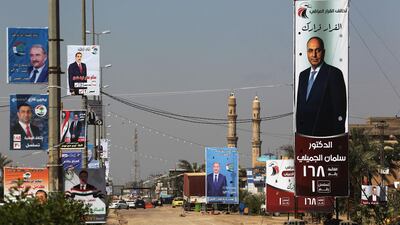Only a decade after their country's first ever multi-party elections, disenchanted Iraqis say "the same old faces" with their vested interests have been running the show since the fall of dictator Saddam Hussein.
"How long have Ibrahim al-Jaafari, Ayad Allawi, Nuri al-Maliki or Haider al-Abadi been in power? One minute as MPs, the next as ministers," said Midan al-Hamadani, listing Iraq's foreign minister, vice president, ex-prime minister and current premier.
"The parties are always the same and the same people come back to power, whether we like it or not," said the 40-year-old Baghdad resident.
Widespread corruption combined with failings in basic services such as water, electricity and transportation have reinforced the public's lack of faith in Iraq's political leaders.
In a country with a long history of conflict and intercommunal violence, more than 24 million Iraqis are registered to elect 320 deputies from a field of around 7,000 candidates on May 12, with 71 seats reserved for the capital.
Baghdad has been inundated with election posters plastered on apartment buildings and even trees.
In some places, candidates' faces have overshadowed posters of the "martyrs" killed in the 2014-2017 defeat of the Islamic State (IS) group in northern and western Iraq.
"It's the same old faces! All they care about is getting rich, not serving the people!" said an angry Haidar al-Shamri, 35, letting rip in a street in central Baghdad.
Since the US-led invasion of 2003 that toppled Saddam, the same political figures and parties have held the levers of power in Iraq.
"So what change has there been? At least if we had a change of faces. We're fed up with lies," was the outspoken opinion of Umm Yussef, a 54-year-old woman from the northern city of Mosul.
Her northern city, Iraq's second largest, was devastated in a ferocious battle to oust IS from its bastion and reconstruction has been stalled by a lack of state funding.
_______________
Read more:
Opinion: It’s time to stop this barbaric and shocking practice
Clinic to fight taboo of female mutilation
________________
Rumour has it that the marjaiya, the highest religious authority of Iraq's Shiite majority, has called for incumbents not to be re-elected. Contacted by AFP, it gave no confirmation.
According to the electoral commission, 20 percent of the candidates are newcomers.
One such new face is Hala Karim, a health ministry employee, for whom "nothing has changed in 15 years (since Saddam's fall), if anything things have gone from bad to worse".
"In this cradle of civilisation, confessionalism is on the rise and the situation is deteriorating. We must change that," said the woman in her 30s running on an independent list, Tahalouf Baghdad (Baghdad Coalition).
The old guard were even resorting to posting defamatory videos online of newcomers to knock them out of contention. "The big sharks can only think of defaming us to stay in power," she said.
Haidar al-Bizani, who is also running, learnt the hard way: he sold a plot of land and quit his job, all to no avail, as he failed to win a seat as an independent at Iraq's last election.
"There is no way an independent candidate can win. The law is to the disadvantage of small lists. That's why I'm running this time on the Hikma list," led by Shiite politician Ammar al-Hakim, he said.
In central Baghdad stands a statue of Kahramana, a figure from "1,001 Nights", as she pours boiling oil on thieves hiding in 40 jars.
Iraqi poet and activist Aya Mansour posted a photograph on Twitter of the monument obstructed by a wall of election posters. "Where's Kahramana? Behind the 40 thieves?" she asked.

